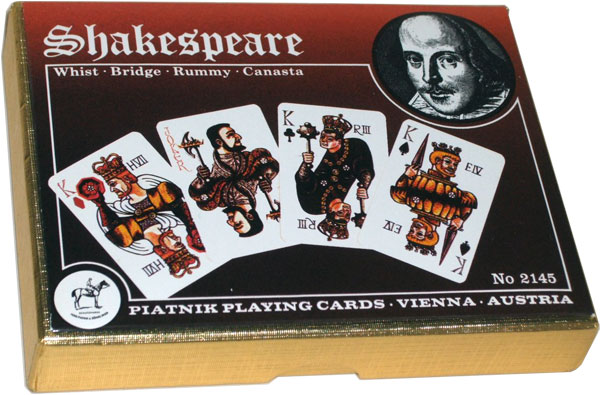Shakespeare by Piatnik
‘Shakespeare’ playing cards by Piatnik designed by the British actor Donald Burton.
The Shakespeare Cards have been produced by Piatnik as one of their suave dual-decks since 1967, confusingly under the numbers No 2145 and No 2445, sometimes with both code numbers being used within the same package!
The cards were designed by the British actor Donald Burton based on his experiences in the historical series of plays known as “the Wars of the Roses” and performed by the Royal Shakespeare Company. The deck uses the suits of Swords, Batons, Cups and Coins designed in such a way as to be recognisable by their British equivalents of Spades, Clubs, Hearts and Diamonds respectively. Each court card represents a Shakespearean interpretation of a character from English history, such as the much misaligned Richard III who true to Shakespearean mythology is depicted as a tyrannical, and evil ‘crookback’.
The package includes a dual-language booklet in German and English describing the deck, suits and characters depicted on the court cards. A Royal Family Tree is also supplied charting the genealogy from Edward III through to Henry VIII.



By Matt Probert
Member since March 02, 2012
I have adored playing cards since before I was seven years old, and was brought up on packs of Waddington's No 1. As a child I was fascinated by the pictures of the court cards.
Over the next fifty years I was seduced by the artwork in Piatnik's packs and became a collector of playing cards.
Seeking more information about various unidentified packs I discovered the World of Playing Cards website and became an enthusiastic contributor researching and documenting different packs of cards.
I describe my self as a playing card archaeologist, using detective work to identify and date obscure packs of cards discovered in old houses, flea markets and car boot sales.
Related Articles

Modern Swiss-German Pattern (carta.media)
Modernizing tradition: balancing clarity and continuity in regional card design.

Tactics Design
Late modernist Japanese playing cards designed by Masayoshi Nakajo for Tactics Design.

Luditz Pattern by Georg Geiselreiter
The discovery of 2024 changes the current state of knowledge of the history of this pattern.

The Decadent Deck
Studies in the eroticism of the female body by Inge Clayton.

Historic Shakespeare
“Historic Shakespeare” playing cards featuring Shakespearean characters by Chas Goodall & Son.

Sunday Night / Nichiyoubi no Yoru
An irreverent, avant-garde deck unofficially titled "Nichiyoubi no Yoru" (Sunday Night), designed by...

Emilio Tadini playing cards
Beautiful dreamlike playing card designs by Emilio Tadini.

Zürcher Festspiel 1903
Swiss-suited pack designed by Robert Hardmeyer featuring figures from art and politics.

Never Mind the Belote
Limited edition Belote pack with designs by a collective of 24 street artists.

Ukraine playing cards
Historical figures from Ukraine’s past in a familiar Piatnik style.

Playing card designs by Franz Exler
Reconstruction of playing cards from the original 1903 designs.

MITSCHKAtzen
Clever cat designs by the Austrian artist and illustrator Willi Mitschka.

22 Pittori in 22 Arcani
Collaborative Tarot with contributions from 22 different Italian artists including Menegazzi and Tav...

Tarock Cards by NIL Spielkartenfabrik
A deck of tarock cards from the eastern end of the ending Austro-Hungarian Empire.

Whist by Ditha Moser
Ditha Moser created this minimalist Whist deck in 1905, in the style of the Vienna Secession art mov...

Keith Haring playing cards
Energetic graffiti images by the American artist Keith Haring.
Most Popular
Our top articles from the past 28 days

